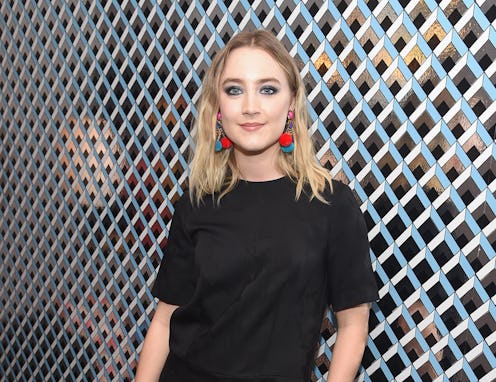Entertainment
Why Feminism In Film Might Be Taking So Long
From Amy Schumer's groundbreaking show to series like Transparent taking over the Emmys to Shonda Rhimes' continued domination of Thursday nights, it's impossible to deny that major change is happening for women on TV. The statistics may still be frustrating — according to a study by the Center for the Study of Women in Television and Film, women made up just 42 percent of all speaking characters on broadcast TV last season — but that doesn't take away from the fact that when it comes to roles for women, TV is transforming itself in a serious way. Film, however, still has a long journey to catch up — and according to actress Saoirse Ronan, it's only just starting to happen because TV stars like Schumer and Lena Dunham have paved the way.
"For me, it’s been those women that have really changed things, because they’re taking it upon themselves to kind of go, 'f*ck you' to the executives who wouldn’t have given them a chance, or would’ve been incredibly sexist," Ronan tells Bustle. "But they’re so good and so talented that they were able to rise up anyway."
The star of this month's Brooklyn and an actress who's worked in Hollywood since she was a child, Ronan is no stranger to the pervasive sexism and gender inequalities present in the industry. Yet, as she told me while at the Savannah Film Festival (presented by SCAD) to promote her film, she's confident that things are changing, thanks in large part to the work done in TV.
"Tina Fey and Amy Poehler and Amy Schumer and Lena Dunham and all these really great women who have these great TV shows and are the boss and the producers and the writers and the leads, they’re a big part in our lives," Ronan says. "They influence what we think about, and what we’re talking about."
So movies, she says, will eventually catch up to the progress made on TV. Ronan insists that filmmakers are "finally being given enough of a backbone and enough encouragement to actually make the stories they want to make," many of which might star or be created by women. Still, there's undoubtedly a long way to go. If you thought the statistics for women in TV were dour, just look at the ones for film; in 2014, only 12 percent of all clearly identifiable protagonists were female, according to a study by The Center for the Study of Women in Television and Film. While the 2015-2016 TV season features women playing everything from Secretary of State to sorority president, there won't even be a female-led superhero movie until 2019. In the fight for gender equality on-screen, film is dragging behind.
And yet there's reason to hope. Despite all eight of last year's Best Picture nominees being male-led stories, the 2016 race is already shaping up to include female-fronted stories like Room , Carol , Joy , and, of course, Ronan's Brooklyn. For the first time in ages, it seems like the majority of the year's biggest movies will be ones about women, and several of them (Suffragette, Angelina Jolie's By the Sea) will be made by women, too. Even the ones that aren't, like Brooklyn, are featuring female-centric stories atypical for films of years past. Although the film deals with a love triangle juggled by Eilis (Ronan), the heart of the movie is its leading lady's own feelings and experiences as a young Irish immigrant living in New York.
"The whole dynamic of one woman and two different male lovers has been seen quite a bit," Ronan says. With Brooklyn, however, "the real heart of the film was always... her relationship with the women in her life."
From her mother and sister back in Ireland, to the girls she lives with at the boardinghouse, the females that Eilis encounter "help her to change, and help her to grow and become this young woman," Ronan says.
Ronan calls Brooklyn an "empowering" movie, and having seen (and loved) it, I agree completely; while Eilis sadly lives within the restrictions that came with being a women in the early '50s, the choices she makes are largely her own, driven by her own desires and motivation. It's a coming-of-age story that sees its lead grow from a shy, passive girl barely out of her teens to a dynamic, thoughtful woman who is able, and willing, to take control of her own life, no matter the pressures she faces. In a sense, Eilis' journey mirrors that of many women in Hollywood, who have chosen to speak up about sexism they've faced and are banding together to make change.
"I think with the likes of Lenny Letter now, a lot of women actually speaking out about their experiences," Ronan says, adding that the memoirs written by Dunham, Fey, and Poehler have tackled the industry's gender discrimination head-on. "We can’t ignore it, now. we have to do something about it, and we have to change it."
And with Brooklyn (along with the upcoming Broadway adaptation of the female-led play The Crucible, in which she'll star alongside Tavi Gevinson), Ronan is helping that change get made, one feminist project at a time.
